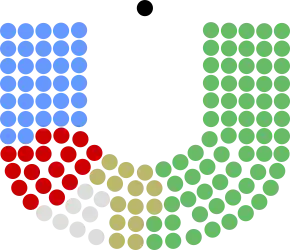| 11th Dáil | |||||
|---|---|---|---|---|---|
| |||||
 | |||||
| Overview | |||||
| Legislative body | Dáil Éireann | ||||
| Jurisdiction | Ireland | ||||
| Meeting place | Leinster House | ||||
| Term | 1 July 1943 – 7 June 1944 | ||||
| Election | 1943 general election | ||||
| Government | 3rd Government of Ireland | ||||
| Members | 138 | ||||
| Ceann Comhairle | Frank Fahy | ||||
| Taoiseach | Éamon de Valera | ||||
| Tánaiste | Seán T. O'Kelly | ||||
| Chief Whip | Eamon Kissane — Paddy Smith until 2 July 1943 | ||||
| Leader of the Opposition | Thomas F. O'Higgins — W. T. Cosgrave until January 1944 | ||||
| Sessions | |||||
| |||||
The 11th Dáil was elected at the 1943 general election on 23 June 1943 and met on 1 July 1943. The members of Dáil Éireann, the house of representatives of the Oireachtas (legislature) of Ireland, are known as TDs.
The Dáil adjourned sine die on 10 May 1944, the day after President Douglas Hyde called a general election for 30 May at the request of the Taoiseach Éamon de Valera. The 11th Dáil was dissolved on 7 June 1944.[1] Exceptionally, the outgoing Dáil was not dissolved until after the election. Although the Constitution requires the President to dissolve the Dáil before a general election, this procedure was overridden by the General Elections (Emergency Provisions) Act 1943.[2][3] The act, which would have been unconstitutional if not for the state of emergency in effect during the Second World War, was intended to increase national security by minimising the interval during which no Dáil was in existence.[3] The 13th Dáil lasted 343 days.
There were no by-elections during this Dáil.
Composition of the 11th Dáil
| Party | June 1943 | May 1944 | |
|---|---|---|---|
| ● | Fianna Fáil | 67 | 66 |
| Fine Gael | 32 | 32 | |
| Labour | 17 | 12 | |
| Clann na Talmhan | 14 | 13 | |
| Independent | 8 | 9 | |
| Ceann Comhairle | — | 1 | |
| National Labour Party | — | 5 | |
Government party denoted with bullet (●)
Graphical representation
This is a graphical comparison of party strengths in the 11th Dáil from July 1943. This was not the official seating plan.

Ceann Comhairle
On 1 July 1943, Frank Fahy (FF), who had served as Ceann Comhairle since 1932, was proposed by Éamon de Valera and seconded by Seán T. O'Kelly for the position, and was elected without a vote.[4]
TDs by constituency
The list of the 138 TDs elected, is given in alphabetical order by Dáil constituency.[5]
Changes
| Date | Constituency | Loss | Gain | Note | ||
|---|---|---|---|---|---|---|
| 1 July 1943 | Galway East | Fianna Fáil | Ceann Comhairle | Frank Fahy takes office as Ceann Comhairle[4] | ||
| July 1943 | Donegal East | Clann na Talmhan | Independent | William Sheldon resigns from Clann na Talmhan | ||
| 7 January 1944 | Wicklow | Labour | National Labour Party | James Everett resigns from the Labour Party and joins the National Labour Party as its leader | ||
| 7 January 1944 | Cork South-East | Labour | National Labour Party | Thomas Looney resigns from the Labour Party and joins the National Labour Party | ||
| 7 January 1944 | Wexford | Labour | National Labour Party | John O'Leary resigns from the Labour Party and joins the National Labour Party | ||
| 7 January 1944 | Kilkenny | Labour | National Labour Party | James Pattison resigns from the Labour Party and joins the National Labour Party | ||
| 7 January 1944 | Kerry North | Labour | National Labour Party | Dan Spring resigns from the Labour Party and joins the National Labour Party |
See also
References
- ↑ "Dáil dissolved". The Irish Times. 8 June 1944. p. 3.
- ↑ "Constitution of Ireland". Irish Statute Book. Article 16.3. Archived from the original on 1 September 2015. Retrieved 27 March 2022.;
General Elections (Emergency Provisions) Act 1943 (No. 11 of 1943). Act of the Oireachtas. Retrieved from Irish Statute Book on 27 March 2018.;
"Adjournment of the Dáil – Dáil Éireann (11th Dáil)". 10 May 1944. Vol.93 No.15 p.3 c.2497–2498. Archived from the original on 23 September 2021. Retrieved 27 March 2022.
I did not ask for a dissolution of the Dáil. This Dáil would not have been meeting to-day if there had been a dissolution. ... I did not ask for a dissolution, because we passed an Act last year to enable the Dáil, during this critical period, to be brought together at any time that there was need for doing so, so that the Executive at any time would have to assemble the Dáil in case there was any national issue that demanded its assembly. ... when the Dáil adjourns now it will not meet again unless there is some national issue which makes it necessary to call the Dáil together.
- 1 2 "General Elections (Emergency Provisions) Bill, 1943—Second Stage – Dáil Éireann (10th Dáil)". Oireachtas. 14 April 1943. Archived from the original on 15 June 2020. Retrieved 27 March 2018.
- 1 2 "Election of Ceann Comhairle – Dáil Éireann (11th Dáil) – Vol. 91 No. 1". Houses of the Oireachtas. 1 July 1943. Archived from the original on 9 August 2022. Retrieved 9 August 2022.
- ↑ "TDs & Senators (11th Dáil)". Houses of the Oireachtas. Archived from the original on 5 May 2018. Retrieved 27 March 2022.